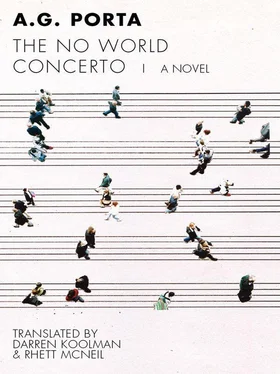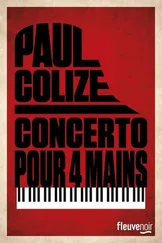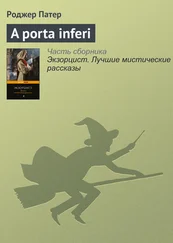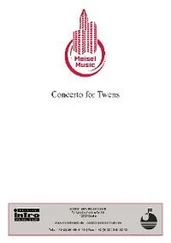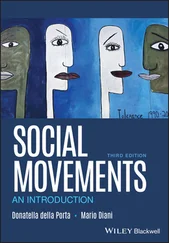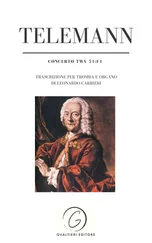She managed to get there by climbing a hill quite near to a plaza that was once frequented by a famous foreign writer. She’s never read any of his works, but she’s definitely heard of him. Even people who don’t read books have heard of him. If she took the screenwriter’s suggestion seriously, this would be an assignation, but there are certain things she won’t do. Perhaps in thirty or forty years she’ll think about it. She still avoids white clothing, her hair is still dyed, and her dark sunglasses just about conceal her features, but the screenwriter recognizes her nonetheless when she sits down in front of him in the café. She looks at him perplexedly, noting the dramatic change in his person: unclean, unshaven, in general disarray — neglect papered over by good manners and a polished accent. Something’s changed in their relationship. Something the girl dare not confess, not even to herself. Do you have any cash? the screenwriter asks. How much do you need? The girl empties her pockets and slaps down some notes and coins on the table. Tell me if it’s true I was hypnotized, she demands, as if her whole life depended on his answer. Do you really want to know? he asks, knowing she won’t like the answer. She nods. He waits a few moments. Yes, he admits, I was there. I saw it all happen. She responds with a look of disgust and gets up to leave. Don’t go, he implores her, taking her hand. The only person who could take him away from his writing is thinking about leaving him again — and just before the culmination of the plot. It’s a common formula: something you’d read in a beginner’s manual on storytelling. How could it be otherwise? Being hypnotized couldn’t have affected her because she already had talent. All that happened was that she’d stopped believing in herself. There’s another pretty obvious point. And it’s as simple as that, he says. So there — it’s no longer a big secret. Do you know of any dark corners nearby? he then asks, smiling suggestively. The girl smiles in turn, but it’s not a happy smile, her eyes say as much, and the screenwriter even detects in them the beginnings of contempt. She brought the pages he requested. He takes them out of her hand, stealing a finger’s caress. Such soft skin, he thinks, as he closes his eyes and kisses her. Everything’s a game, the girl hears him say, a game of two people’s shared pain. Only a game, nothing more. Do you think I’m crazy? the girl asks him, offering her hand again, as if to prove it’s made of flesh and bone, as if to prove there really is a world, and that somewhere in that world there’s a crusty old screenwriter sitting at a table in a café with all his worldly possessions at his side, everything he owns, stuffed into a big plastic bag, save the old-fashioned typewriter before which he sits, upon which he’s trying to finish his story, having stopped momentarily to take a girl’s hand, who wants to know if she’s barking mad. He doesn’t answer, but wants to know why she’s asking. She lies and tells him there’s no particular reason. Then she takes back her hand and leaves. The screenwriter stays seated, hardly budging, as he reads the pages that will guide him toward the conclusion of his story. Some people would call it the climax, but not him. Though he doesn’t even remember the technical terms designating the separate parts of a story’s arc. But he’s not going to be teaching any classes in paradise; there’ll be no more literature students, so he doesn’t need to know the terminology now. But he can still invoke them instinctively, even if he doesn’t know their names, and that’s all that really matters in the end. All that matters, he says, bracing himself before the typewriter. Only a few pages left, he tells himself, as he considers the next scene, which is set in one of the lounges of the hotel with the English name. The girl is standing next to the piano as her mother, wearing the gravest expression she’s yet shown, is handing her a large envelope. The envelope is unsealed, and the girl shows little interest as she inspects the contents: a videocassette and some photographs. She reseals the contents and leaves it on the tail of the piano. There’s no need for closer scrutiny; even if she might have denied it to herself, she’s always known what her destiny would be. Do you know how much damage this will do if it gets to the press? asks her mother from the other side of the piano. What’s the difference? asks the girl. As long as they manage to fill a soccer stadium, it doesn’t matter if a person sells their mind, their body, or their talent to do so. With the publicity these photographs will generate, combined with her skills on the piano, the girl will set the standard for the music of the future. This will be the kind of music they’ll listen to in the City in Outer Space. You better hope your father doesn’t find out, warns her mother, because I don’t know what he’ll do! The girl continues imputing her mother’s incapacity to see the bigger picture. Not what he’ll do to you, adds her mother, but to that teacher of yours. The girl asks if they’re demanding money, although she has a feeling the anonymous sender has already achieved his aim, and that it wasn’t blackmail, but to expose her relationship with the screenwriter to her parents. Moreover, she thinks she knows exactly who the anonymous sender is. The number of possible suspects wouldn’t exactly fill a soccer stadium. Her mother’s called the Principal of the Scholastic Institute to alert her of the situation. But if there’s no blackmail, there’s no point in getting worked up, says the girl. Her mother wants to know how long the relationship’s been going on. The girl says she hasn’t been keeping track — a year, perhaps. They’re going to fire him, her mother says, taking a few steps around the piano, thinking out loud, without looking at her daughter. He’ll probably never be able to teach again. His reputation will be ruined. What I don’t know is what to do with you, she says, stopping and looking back at the girl. How could you have done such a thing? A few moments go by, adding tension to the scene. If it was for money, all you had to do was ask. The girl smiles archly, but her mother keeps her eyes fixed on her. If it wasn’t for money then what was it? The girl doesn’t answer. What was it? her mother insists. You wouldn’t understand, the girl says at last. Her mother assures her she’ll do her best to understand. The girl walks away from the piano and goes to the window. The day’s become misty, but she can just make out a bridge overlooking the river. It was just a game, she says. A game? With him? But he’s a grown man! The girl turns to look at her mother and smiles mischievously again, because she knows it gets on her nerves. No, a game with your favorite musicians: the young conductor and brilliant composer. At night, while the screenwriter heads back to the bridge to get some sleep, he thinks about the pages the girl’s been sending him. If anything, it’s still a little vague in places, he thinks. She needs to make more explicit the link between the aliens and the No World. He rummages through some garbage and eats a piece of stale bread and a half-eaten apple someone else discarded. After exploring the bin to its very bottom, he manages to find a newspaper, so he goes to the nearest streetlight to sit down and read.
As he did the day before, the screenwriter walks the streets begging for change that he then spends on sandwiches and coffee. He goes to the fountain in the plaza to get a drink of water and then goes into the café to sit at his table and continue writing. The waitress occasionally pauses at his table to contemplate his furious, almost deranged expression as he types. He can’t keep going like this, she warns. He only asks for two more days, as if he was requesting an extension, two more days and he’ll be finished. Then he can roll over and die. To die peacefully, violently, perhaps indifferently. . he’s not sure which adjective applies. The waitress watches him closely as he says these words. She smiles at him. The screenwriter still feels quite distant from her, and yet the connection between them has never been closer, and although his face is haggard, piteous, he manages to smile back at her. He writes without stopping, until midday, when the girl pays him a visit. She’s wearing a wig this time, because she once again thinks they’re following her. She’s carrying more pages with her. They’re the last, she says. The screenwriter acknowledges to himself he’s nearing the end of the script, the end of love, the end of life perhaps. Will you be back? he asks her. She says no. She’ll be going back home as soon as possible. The screenwriter would have liked to start a new life with her, to have conquered every adversity with her, to have created something he’s never managed to create. The girl sits on the other side of the table, of the typewriter, listening to him say these things once more. I never promised you anything, she says. Then all that’s left for him to do is croak at his writing desk. Die with his boots on. He murmurs something incoherently about the time he has left, before asking her what day it is. Wednesday the thirty-first, she says, and the screenwriter gets lost in his usual reverie, imagining the two of them just barely scraping by together, but still happy since they’re together, on some faraway beach, dealing with life’s adversities by making love all day and all night until they expire. There are two ways to die with one’s boots on, he assures her, making love or writing. Then why die on some faraway beach? she asks him, implying he can die making love or writing in any old place. The screenwriter starts going over the pages she’s brought him. There are only a few of them, but they’re crucial, indispensable. They mean everything, actually. Then, without looking up, he asks her to wait another day or two before abandoning him and the neighboring country’s capital. Yes, they mean everything, he mumbles. They mean the story has come full circle. Are the circles concentric or spiral? Oh, what does it matter? The screenwriter’s words are becoming intelligible only to himself. So the girl gets up and leaves him to his musings; leaves him as she begins to doubt his sanity, turning to give him one last look before leaving the café terrace. The scene ends with a distant shot of the screenwriter sitting alone in the corner, talking to himself, although it looks like he’s mouthing the words he’s typing in his almost furious derangement on the typewriter.
Читать дальше
